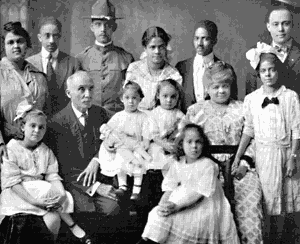Born in Nashville, Tennessee on February 18, 1852, and educated at the law school later affiliated with Northwestern University, Ferdinand Lee Barnett was an attorney, writer, lecturer, and the editor and founder of Chicago’s first black newspaper, the Chicago Conservator. Although he is often remembered today as the husband of anti-lynching crusader Ida B. Wells (1862-1931), Barnett was at the time a widely known advocate of racial equality and justice. His speech, “Race Unity,” given in May of 1879 to a national convention of African American men in Nashville, Tennessee, for example, illustrates his commitment to racial justice as does his work for the Conservator.
Barnett founded the Chicago Conservator on January 1, 1878. It was Chicago’s first and Illinois’s second black newspaper having been preceded in 1862 by the Cairo Weekly Gazette. Barnett’s four-page six-column Conservator had an approximate circulation of 1,000 in its early years, a remarkable statistic given that Chicago’s black population numbered only 6,480 in 1880, just 1.1 percent of Chicago’s total population. Articles on the “race problem,” black participation in politics, and local community news constituted the bulk of the paper’s offerings. In contrast to later newspapers, which tended to sensationalize racially divisive stories, especially those coming out of the South, the Conservator was perceived as even-handed in its coverage yet firm in its insistence upon racial equality. In 1882, just four years after founding the Conservator, Barnett relinquished editorial control of the paper to devote himself to the practice of law.
In 1895 Barnett sold the Conservator to Ida B. Wells who continued to publish the paper until 1914. Barnett and Wells also married in 1895. The Barnetts raised a family that included their four biological children—Charles Aked (1896), Herman Kohlsatt (1897), Ida B. Wells, Jr. (1901), and Alfreda M. (1904)—in addition to Ferdinand’s two sons from his first marriage, Ferdinand Lee Barnett Jr. and Albert Graham. Barnett’s first wife, Molly Graham Barnett, died when their children were still quite young, ages four and two respectively. In 1901 the Barnett’s decision to purchase a home east of State Street in an all-white neighborhood exposed them to hostility from some within the white community but no overt acts of violence.
As a prominent Chicago attorney, Barnett served fourteen years as assistant state’s attorney having been appointed by Republican Governor Charles S. Deneen. Additionally, Barnett served as the attorney for the Wells-Barnett’s Negro Fellowship League. In that capacity he argued and won a case before the Illinois Supreme Court on behalf of an African American man wrongly accused of murder. Ferdinand Lee Barnett died in Chicago on March 11, 1932, one year after the death of his wife. He was 84 at the time of his death.

